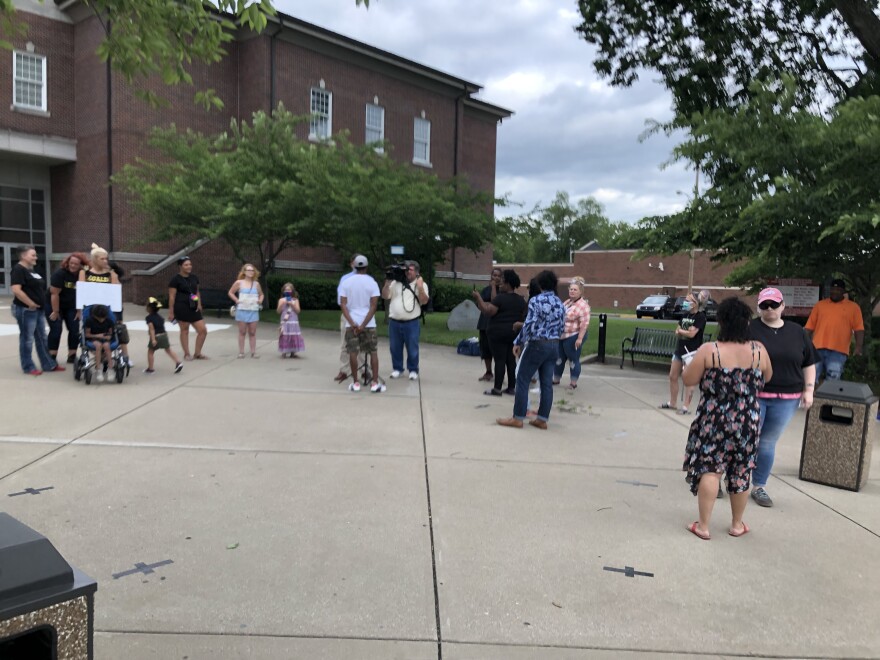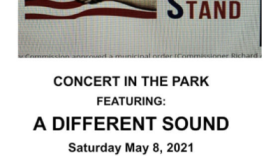Paducah and McCracken County elected officials say a closed-door “unity” meeting with black community leaders Wednesday evening is just the start of community discussions about police accountability and racial justice.
Yet, a few protesters outside the McCracken County courthouse where the meeting was held say their perspectives weren’t heard in the meeting. Judge-Executive Craig Clymer arranged the meeting that included ten other people, according to a press release:
Paducah Mayor Brandi Harless
Paducah Police Chief Brian Laird
McCracken County Sheriff Matt Carter
Paducah City Commissioner and Mayoral Candidate Richard Abraham
Paducah Mayoral Candidate and Businessman George Bray
Paducah Mayoral Candidate and Protester Dujuan Thomas
NAACP Paducah Chapter President J.W. Cleary
Paducah Innovation Hub Assistant Principal Cordin Snardon
Former Paducah Police Officer Shawn Maxie
McCracken Circuit Judge Tim Kaltenbach
Clymer said the media wasn’t invited to the hour-long meeting to allow for more honest discussions. He said despite disagreements, everyone in the meeting had a general goal of improving community policing and race relations. At one point, Clymer said, the conversation took on a historical context.
“There was an expression by a member of the group that thought we hadn’t done much in the last couple hundred years, and some of us took exception to that. We had some great, open conversations,”Clymer said. “I’ve lived here for 66 years, and we’ve come a long way. But I think it’s important that we have these conversations and see, can we do even more.”
Other elected officials who spoke with media afterward said the meeting was more about raising awareness of current law enforcement policies and policing practices instead of proposing future changes. Paducah City Commissioner Richard Abraham said he believes city and county law enforcement do “a great job” with reviewing use of force in arrests.
Abraham said he and his wife teach their kids to be respectful toward law enforcement but to also be aware of their rights when interacting with them. He also wants to hear from others about their experiences with police, too.
“You’re looking at personnel, you’re looking at policies. What policies do we have within our police department that could be problematic,” Abraham said. “I’m pretty sure as we move forward, there will be other conversations, other stories.”
Paducah Mayor Brandi Harless said the group is scheduling a follow-up meeting in about two weeks with conversation about “action-item ideas” based on the information provided by law enforcement and community leaders. While activists in larger cities including Louisville have called on city leaders to “defund” police department budgets and reinvest in other city services, and to enact specific use-of-force restrictions on police, Harless said those topics didn’t come up in the meeting.
“I don't think anyone is interested in having the direct ‘defund’ conversation. I think that’s kind of been misunderstood across the country and the intention of what that term meant,” Harless said. “But I do think some of those ‘Eight Can’t Wait’ can be brought up in conversations. Some of them I think we’re already doing.”
Harless said during the next planned meeting, she wants to discuss the eight use-of-force initiatives detailed by the police reform campaign Campaign Zero. She said she was encouraged to hear law enforcement officials express a desire for improvement in the meeting. She also said she was doing “debriefs” with City Police Chief Brian Laird and City Manager James Arndt, based on recent community feedback she’s receiving regarding policing.

Yet, a few protesters outside the county courthouse said their perspectives weren’t heard by those in the meeting. The meeting was previously scheduled June 3 when one of the meeting’s attendees, a protester named Richard Dillard, was arrested on outstanding warrants. Dillard was not invited to the June 10 meeting.
Judge-Executive Craig Clymer said he attempted to talk with protesters outside, but said they were being too disrespectful and “boisterous.” He said he would consider inviting protesters to meetings as it was needed.
“I don’t need that stuff. I wanna deal with people who got a motive in their heart and say, ‘I wanna make this community better.’ Not a motive of, ‘Look at me, I’m loud, I’m boisterous,’” Clymer said.
Protesters called out to Clymer as he was leaving the courthouse. When asked about the protesters, Brandi Harless said those not invited to the meeting could talk at other virtual meetings she hosts during evenings in June. Richard Abraham said there would be future meetings in other forums beyond the county courthouse where community members could speak.
Richard Dillard and his son, Tre’shawn, were among the protesters outside the courthouse. Tre’shawn said Clymer is mistaking their passion for loudness.
“Now they don’t want us to attend because they need level-head people in that meeting. No, you need someone from these neighborhoods in this meeting,” said Tre’shawn Dillard. “[Policing] is one of the issues. But the main issue in this city is our neighborhoods. Our housing authorities.”
Tre’shawn said community meetings should discuss how people of color are treated in other aspects of government, not just policing.





